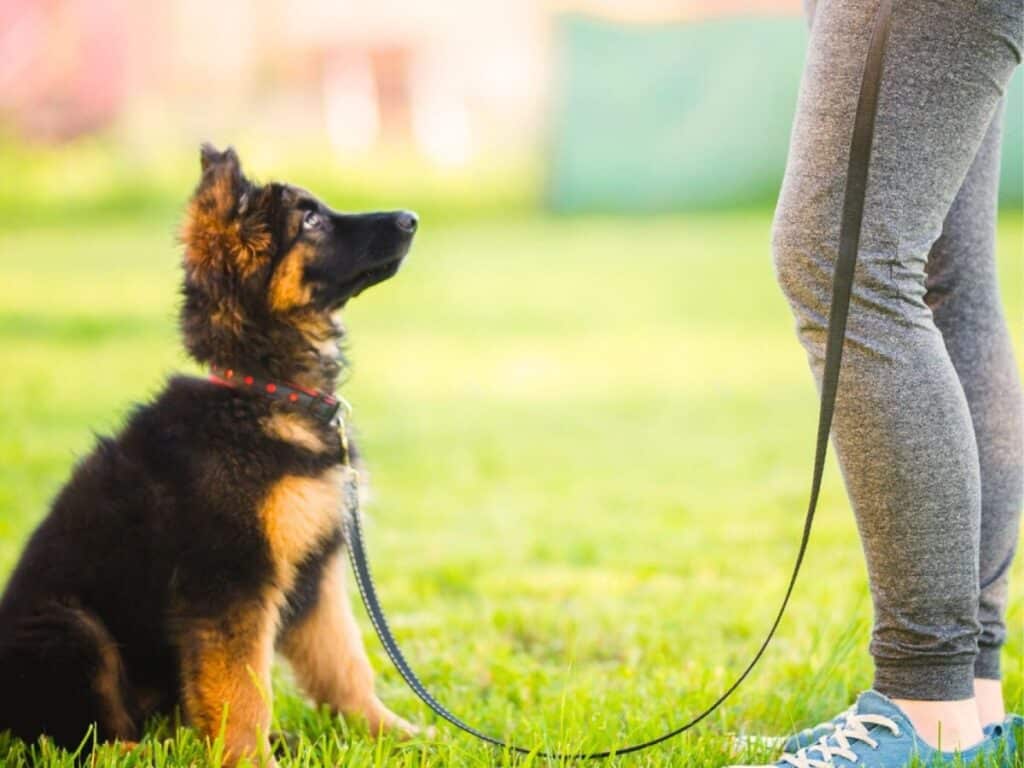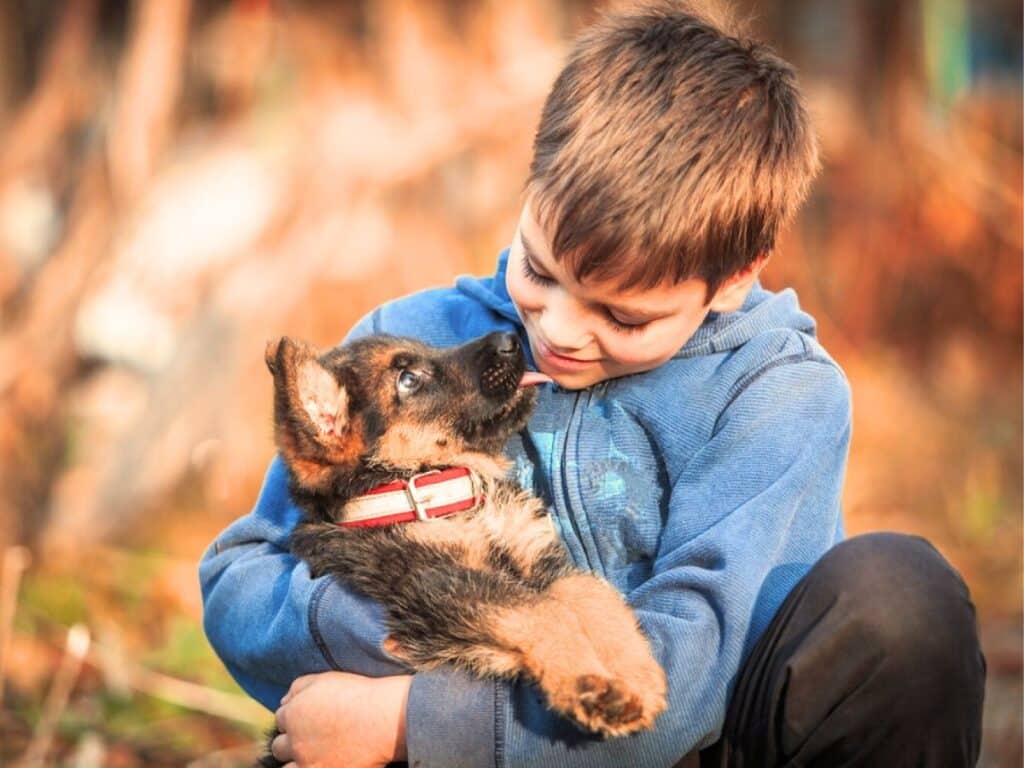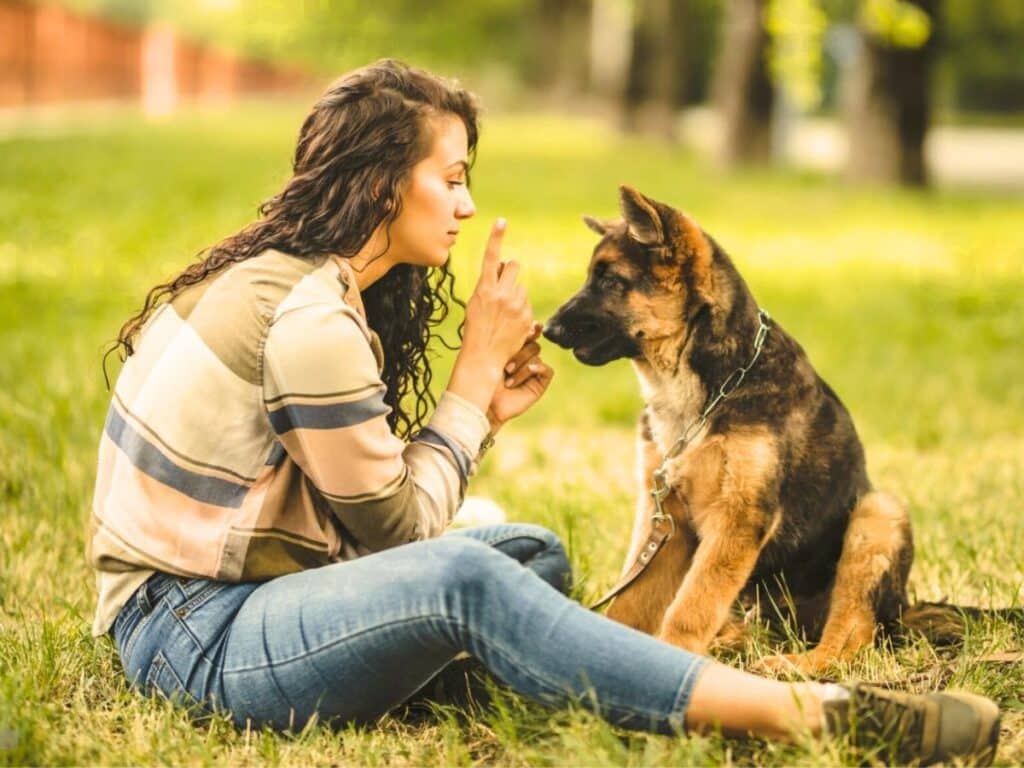Welcoming a German Shepherd puppy into your home is a joyful and exhilarating experience, yet it comes with its fair share of challenges, notably in the realm of discipline. Teaching your furry friend the ropes of good behavior is crucial not only for your sanity but for their safety and well-being.
This blog post is designed to be your go-to guide on how to discipline a German Shepherd puppy, covering effective techniques, common pitfalls to avoid, and tips for understanding your new pet’s behavior.
From the fundamentals of positive reinforcement to the intricacies of setting boundaries and limits, we’ll explore methods that foster a respectful and loving relationship between you and your puppy.
Why Do Puppies Misbehave?
While it’s natural for puppy parents to feel frustrated or concerned about undesirable behaviors, understanding the common reasons behind these actions can significantly improve training outcomes.
Here’s a look at why puppies misbehave and what these behaviors really mean.
1. Teething and mouthiness
Just like human babies, puppies go through a teething phase where they experience discomfort as their teeth grow in.
This period prompts them to chew on anything they can get their paws on to relieve the pain. Without suitable alternatives, this often includes furniture, shoes, or even hands.
Providing chew toys and practicing redirection can help manage this behavior, teaching your German Shepherd pup what is appropriate to chew on.
2. Seeking attention
Puppies crave attention and interaction. When they feel neglected or desire more engagement, they may resort to behaviors like barking, whining, or jumping up.
These actions are often reinforced inadvertently by owners who respond to them, thereby teaching the puppy that such behaviors are effective ways to gain attention.

3. Energy surplus
Puppies have an abundance of energy. Without adequate outlets for this energy, they can engage in destructive behaviors out of boredom or frustration.
Regular exercise, interactive play sessions, and mental stimulation (through training exercises or puzzles) can help tire them out physically and mentally, reducing the likelihood of misbehavior due to pent-up energy.
4. Lack of training and boundaries
Puppies aren’t born knowing the rules of human households. They need consistent training to learn commands and what behaviors are acceptable.
5. Fear or anxiety
Sometimes, misbehavior is a manifestation of fear or anxiety. This can be in response to unfamiliar environments, loud noises, or new situations.
Socialization, gradual exposure to various stimuli, and creating a safe, comforting environment can help alleviate these fears.
6. Exploration and play
Lastly, puppies are naturally curious and learn about their world by exploring and playing.
This sometimes results in behaviors like digging, chewing, or exploring areas they shouldn’t.

Tips for Disciplining Your German Shepherd Puppy
Disciplining your puppy doesn’t mean punishment. It’s about guiding them to understand right from wrong in a loving, constructive way.
Here are practical tips to discipline your puppy effectively, ensuring they grow into well-behaved, happy dogs.
1. Teach basic commands
Basic commands like “sit,” “stay,” “come,” and “leave it” are invaluable for managing your German Shepherd puppy’s behavior. They also provide mental stimulation and help strengthen your bond.
2. Be consistent
Consistency is key in puppy training. Use the same commands for behaviors you want to encourage or discourage.
If “down” means “lie down” today, it shouldn’t mean “get off the couch” tomorrow. Consistent communication helps your GSD puppy understand your expectations.
3. Use positive reinforcement
Reward good behavior with treats, praise, or playtime. Positive reinforcement makes training a pleasant experience for your German Shepherd puppy, encouraging them to repeat those behaviors.
Remember, rewards must come immediately after the desired action to make the connection clear.
4. Redirect bad behaviors
Instead of scolding your GSD puppy for unwanted behaviors, redirect their attention to something positive.
For instance, if they’re chewing on furniture, offer them a chew toy instead. This teaches them what they’re allowed to do without negative interactions.

5. Set boundaries early
Teach your puppy the limits of acceptable behavior from the start. Use gentle, consistent training methods to establish rules.
For example, if you don’t want your puppy on the furniture, gently place them back on the floor each time they climb up and reward them for staying off.
6. Ignore attention-seeking behavior
Puppies will often whine, bark, or jump up to get your attention. Ignoring these behaviors can effectively discourage them.
Pay attention to your German Shepherd puppy when they’re calm and quiet to reinforce that this is the behavior that gets your attention.
7. Time-outs for inappropriate behavior
If your pup becomes too boisterous or is behaving inappropriately, a brief time-out can be an effective discipline tool.
This doesn’t mean isolating them in a scary or uncomfortable place but gently removing them from the situation and giving them a moment to calm down in a safe, quiet space.
8. Socialization
Proper socialization can prevent many behavioral issues by exposing your German Shepherd puppy to different people, animals, environments, and situations in a positive way.
Well-socialized puppies are usually more well-adjusted and less likely to exhibit undesirable behaviors out of fear or aggression.
9. Avoid physical punishment
Physical punishment can lead to fear, anxiety, and aggression in dogs. It damages your relationship with your puppy and can make behavioral issues worse. Always use positive, reward-based methods instead.
10. Be patient and understanding
Remember, your puppy is just learning about the world and will make mistakes. Patience, understanding, and consistency are crucial in teaching them how to behave.
Celebrate their progress and understand that training is a gradual process.
Disciplining your puppy is an integral part of their development and your relationship with them. By employing these practical tips, you’ll help your puppy learn acceptable behaviors in a positive, supportive environment.
RELATED:
- How To Socialize Your German Shepherd: Checklist Included
- 30 German Shepherd Training Commands & Free PDF

What to Avoid in Disciplining Your Puppy
While it’s important to guide your German Shepherd puppy’s behavior, there are several approaches and actions that can hinder their learning and damage your relationship.
Here are key things to avoid when disciplining your puppy.
- Physical punishment: It can cause fear and aggression, damaging trust.
- Yelling or harsh reprimands: Scaring your puppy does not facilitate learning.
- Inconsistency: Sends mixed signals, confusing your puppy.
- Delayed reactions: Corrections must be immediate to be understood.
- Crate as punishment: The crate should be a safe space, not for time-outs.
- Overwhelming your puppy: Focus on teaching one or two behaviors at a time.
- Neglecting positive reinforcement: Always acknowledge and reward good behavior.
- Ignoring the cause: Address underlying reasons for bad behavior, like boredom or anxiety.
- Setting unrealistic expectations: Be patient and understand your puppy’s learning pace.
- Comparing your puppy: Each puppy is unique; focus on their individual progress.
Remember, discipline should always be about teaching, not punishment, and the goal is to foster a happy, healthy bond with your pet.
RELATED:

Training Aids to Help Discipline Your Puppy
Training aids can significantly enhance the discipline and learning process for your German Shepherd puppy, making training sessions more efficient and enjoyable.
Here’s an overview of some useful training aids and how they can be employed.
1. Clickers
- What they are: Small handheld devices that produce a consistent sound when pressed.
- How they help: Used for “marking” a desired behavior the exact moment it happens, followed by a reward. This clear communication helps your puppy understand which behavior is being rewarded.
- Best for: Teaching new commands, shaping behaviors, and reinforcing positive actions.
Here’s a good clicker along with a training treat pouch that I found on Amazon.

2. Treats
- What they are: Small, tasty rewards for your puppy.
- How they help: Serve as a powerful motivator and reward for desired behaviors. It’s important to choose healthy options and consider treat size to avoid overfeeding.
- Best for: Almost all types of training, including obedience, tricks, and potty training.
3. Training Toys
- What they are: Toys specifically used as rewards in training sessions.
- How they help: Can be as motivating as treats for some dogs and are especially useful for play-driven puppies. They also provide a way to bond with your puppy through play.
- Best for: Teaching fetch, recall commands, or as rewards in agility training.
4. Harnesses and Leashes
- What they are: Tools for controlling and guiding your puppy during walks or training.
- How they help: Prevent pulling and provide better control without choking. Harnesses are especially useful for puppies learning leash manners.
- Best for: Leash training, outdoor training sessions, and safe socialization.
5. Puzzle Toys and Feeders
- What they are: Toys and feeding devices that challenge your puppy’s problem-solving skills.
- How they help: Stimulate your puppy’s mind, reduce boredom, and slow down eating. Great for mental stimulation and teaching patience.
- Best for: Indoor activities, alone time, and slowing down fast eaters.
Here’s a best-selling Puzzle toy feeder I found on Amazon.

Incorporating these training aids into your German Shepherd puppy’s discipline and training regimen can make a significant difference in their learning curve.
When to Seek Professional Help
There are certain situations where seeking professional training or behavioral consultation for your puppy becomes a prudent choice.
If you encounter persistent behavioral issues that do not improve with basic training techniques—such as aggression, excessive fearfulness, severe separation anxiety, or uncontrollable barking—it might be time to seek expert advice.
Additionally, if your German Shepherd pup displays behaviors that could pose a risk to their safety or the safety of others, such as resource guarding or extreme reactiveness, professional intervention is advisable.
A professional trainer or behaviorist can provide customized strategies and support, helping you understand the root cause of these behaviors and offering effective solutions.
Early intervention is often key to preventing these issues from escalating, ensuring a happier and healthier relationship between you and your puppy.
Conclusion
Remember, at the heart of successful puppy discipline are patience, consistency, and positive reinforcement. These principles are not just techniques but the foundation for a lifelong bond. The journey of raising a puppy is filled with learning opportunities for both you and your pet. Embrace each moment, celebrate progress, and be patient with the process.
FURTHER READING:




